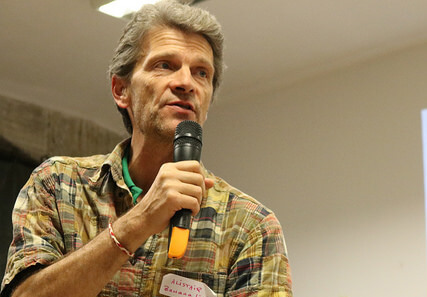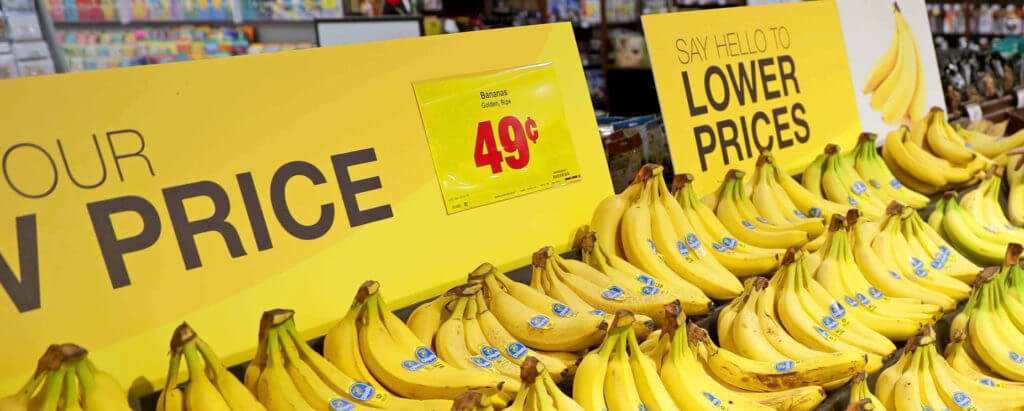 By Alistair Smith
By Alistair Smith
Banana Link International Co-ordinator
7 March 2018
Few can doubt that our common future is at stake as the transformation towards a sane, humane and ecological world is threatened by forces that instruct us that not much needs to change. Not surprisingly, the world’s most traded fresh product finds itself in the eye of various storms.
In this first part, I take a look at some of the ideas at stake and the latest developments at the consumer country end of the chain in three of Europe’s biggest banana markets. In a later second piece, I will be looking at emerging trends in relations between the big fruit companies, small farmers and hired workers.
The ‘Rulers of the Chains’ in perpetual motion
It is by now well established that the economic power in the international product chains that account for 80% of the global trade in goods lies with the new ‘rulers’, the buyers and sellers that form the interface with the vast majority of consumers in the global North and an increasingly large proportion in the biggest countries of the global South.
These new ‘rulers’ are the big retailers, supermarket brands, the so-called ‘gate-keepers’ between handfuls of producers and traders and billions of customers. In banana chains it is they that have been setting prices, commercial terms and conditions, as well as the conditions of production for a couple of decades already. In other chains, this same phenomenon may be observed somewhat more recently.
Their names and most famous brands are Walmart, Tesco, Carrefour, Aldi and Lidl. Worldwide, they buy and resell one banana in every bunch traded outside their country of production.
Diverging strategies in Germany
In Germany, and by extension across the whole of the EU, the battle for banana ‘concepts’ is at its fiercest since Lidl announced in 2018 that it was changing its 100% Rainforest Alliance labelling strategy for 100% Fairtrade labelled bananas across Europe. As of February 2019, this strategy is under way or complete in ten of the 28 EU member states where it has stores, increasing the volumes of Fairtrade labelled bananas sold in the EU by at least 50%, once the plan is rolled out.
Meanwhile, Lidl’s historic competitor Aldi has brought together its two companies (North and South) to buy annually for the twenty-two countries where it has stores in Europe and North America in a single annual contract for the first time. The company made headlines around the world in October 2018 when it became known that it was cutting “at least 50-euro cents” off the (already low) price it expected suppliers to accept for the 2019 contract.
Despite huge pressure from the industry in four major Latin American exporting countries, along with civil society organisations, in particular Oxfam, Aldi went ahead and found traders prepared to sacrifice their margins at the new, unsustainably low price.
The German Minister of Economic Development and Cooperation, Gerd Mueller, went as far as denouncing the behaviour of Aldi in the media, now retailing their conventional bananas at prices as low as 0.79 euros/kilo. The Minister compared Aldi’s irresponsible strategy with the move by Lidl in the opposite direction, thereby highlighting this historic divergence in commercial strategy between the two rivals.
Aldi, a fellow member of the World Banana Forum, is now under pressure from the whole industry, including its global competitors, to review its purchasing practices for next year’s strategy. The other two big traditional chains in Germany, Edeka and Rewe, have long since chosen not to compete on banana price with Lidl and Aldi.

Retail consolidation United Kingdom
Meanwhile in the UK, the second biggest European banana market, the Walmart subsidiary Asda is scheduled to buy J Sainsbury, pending a decision by the British competition authorities in the next few weeks. The merged “Sainsda”1 chain would have over 30% market share, overtaking the historic giant Tesco. Between them, the two would control close to 60% of the UK’s grocery market. Although, in the event of the merger proceeding, it is unknown what fate might await the former’s 100% Fairtrade banana strategy, in place since 2007.
In order to keep pace with the banana price wars declared in 2002, when Asda had been bought by Walmart, Sainsbury has been losing money on every box of loose bananas sold since 2012, selling at well below the cost of purchase, a practice not allowed in either France or Germany.
Aldi and Lidl’s UK operations have also taken over market share from all the big four and now have bigger sales than the historically dominant Co-operative Group. Between them, their so-called ‘hard discount’ model now takes third place behind Tesco, Sainsbury and Asda, ahead of Morrison.
The Sainsbury board chair, David Tyler was quoted earlier this month as saying, “If we don’t get the Asda merger, you’ll hear our rivals cheer from Germany!”2. Commenting in the same interview that “my main motivation is to create value for shareholders and to make a difference to people’s lives”, calls into question the company’s self-vaunted ethical lead as the first major retailer in the world to convert to 100% Fairtrade.
Could the ‘difference’ that Tyler refers to be the livelihoods of small banana growers and plantation workers, if the company’s Fairtrade policy and sustainability standards are ditched in the rush to compete with companies working on much tighter margins?
“Vive la difference” in France
In France, the situation is quite different: consumer prices have remained much higher and, on average, are still close to double the UK retail price and around 50% higher than the German average, leaving much more room for manoeuvre when it comes to a fairer distribution of value along the chain.
Banana price promotions in French stores only tend to last a week or two, although they have become more common in recent times. The industry body that brings together all the players from the French Caribbean producers through to the powerful retail association FCD is currently seeking to stop such promotions being at the expense of growers and other operators nearer the beginning of the chain.
The international Carrefour group, with stores in 30 countries on five continents (from Indonesia via Senegal to Argentina) is now rolling out a different and far more visionary strategy than some of its global rivals, with around one third of its sales now being organic and Fairtrade certified. It is leading a process of agroecological conversion with all its international banana suppliers, including the traditional big three multinationals that still own big plantations across Latin America3. By 2022, all the group’s banana suppliers worldwide will need to produce credible conversion plans that include radical agrochemical reduction, with technical support from the world’s leading tropical fruit research institution, CIRAD.
This follows the move of France’s Compagnie Fruitière group, which declared its intention in June last year to shift all its production to agroecological systems, organic and diversified where possible, by 2025. In Ghana and Ecuador in particular, this strategy is already paying off, with over 1,500 hectares already in organic production and Fairtrade certified.
The game is already changing
Carrefour, along with Morrisons in the UK, is showing the way by introducing bananas produced by organisations of small farmers in South America in ‘polyculture’ systems (farms also growing cocoa, mangoes, avocados, citrus, as well as food and tree crops). Banana Link’s call to explore production systems “beyond monoculture”4 has been heard by these visionary retailers who are determined to help generate a positive social and environmental impact in the farms and communities supplying the bananas they buy and resell.
At the same time, the banana world is witnessing the birth of a new consciousness in relation to the importance of the big family of bananas and plantains that are crucial in the staple diet of some 400 million people across the tropics. Big tropical fruit companies like Chiquita and Compagnie Fruitière are now exploring the role that they will have as economic citizens in contributing through production, research and communication to the future of tens of millions of smallholders whose households depend for their food security on the very fruit that the exporting companies have been bringing to the world market since the late 19th century.
Could it be that, finally, nearly 15 years after the second International Banana Conference “Reversing the Race to the Bottom” – co-organised by the alliance of plantation workers’ unions, small farmers’ organisations and the European Banana Action Network – we are on the brink of real systemic change in this most emblematic of globalised industries? Could a real “Race to the Top” be emerging as we reach 2020?
Footnotes
1. As the potential new giant merged retailers has been billed in the British fruit trade media.
2. The Times, 9th February 2019. The quotation in the text was used in the title of the newspaper feature, but is a paraphrase of Tyler’s words. The actual quotation from Tyler used in the text of the article was “If the Competition & Markets Authority give us a really hard time, the cheers in the two schlösser where Mr Aldi and Mr Lidl respectively live will be heard in London.”
3. Fresh Del Monte, Dole Food and Chiquita Brands
4. Banana Link, with support from Agrofair Europe, organised a Round Table with this title in Haarlem (NL) in February 2018. The participants from the Eastern Caribbean, Latin America, France and the Netherlands spent the day around ten thousand dried banana skins that are part of a social sculpture installation by Shelley Sacks. See: www.exchange-values.org
